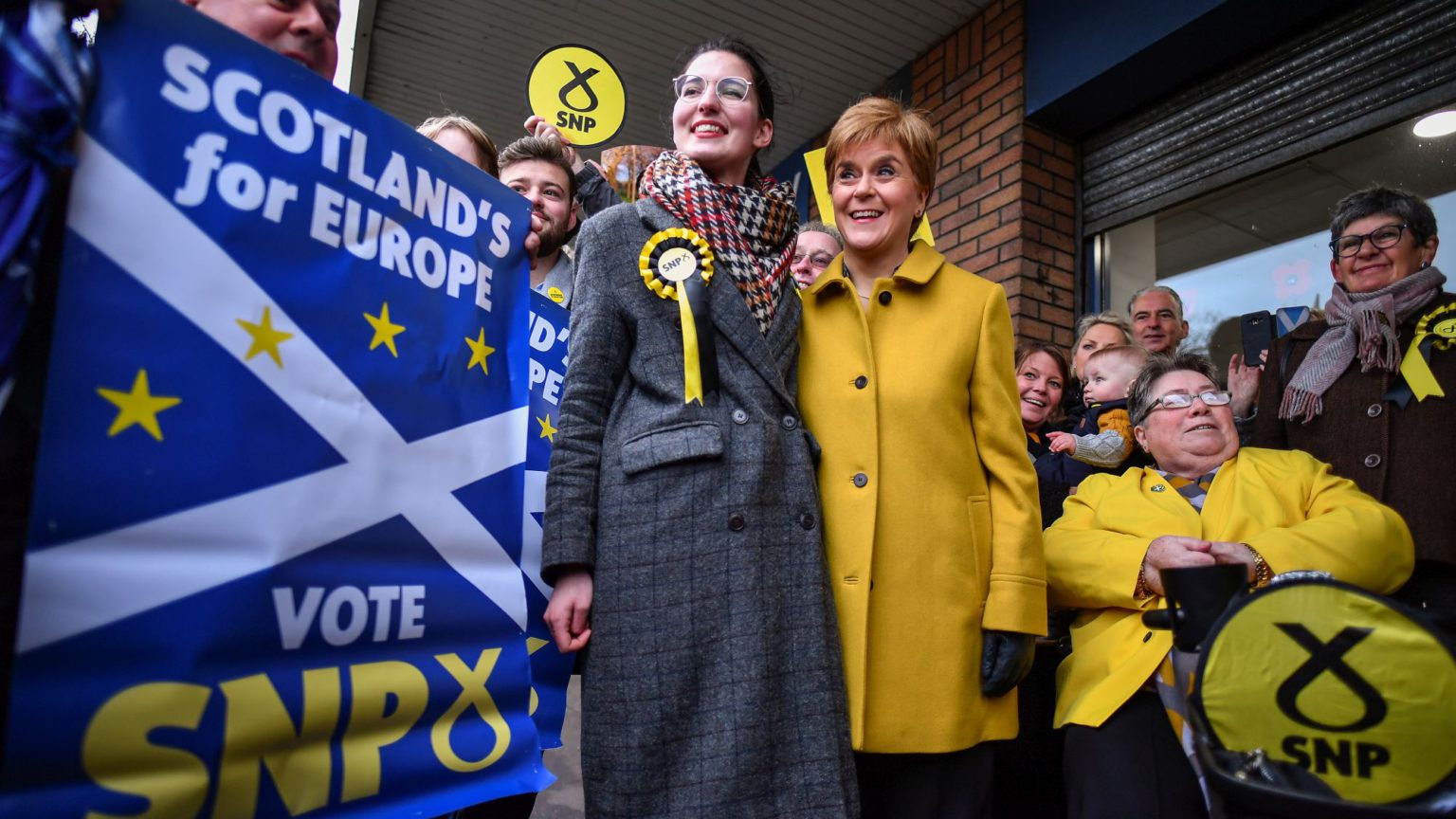The SNP is against national independence
It doesn't want sovereignty for the UK, just as it doesn't want sovereignty for Scotland.

The upcoming General Election has put the question of Scottish independence and, with it, the future of the Union, centre stage. So for the Scottish National Party leader, and Scottish first minister, Nicola Sturgeon, an SNP victory would represent an ‘unequivocal and irresistible demand’ for a second independence vote. She later added that any party wanting SNP support to form a government, shouldn’t ‘pick up the phone’ without first agreeing to a second referendum on Scottish independence. Being the opportunist that he is, Labour leader Jeremy Corbyn was first to make that call.
The possibility of an SNP-Labour election pact has prompted a social-media frenzy among nationalists on the viability of a Corbyn government as a potential route to independence. No doubt, if Labour fails to get elected, those same nationalists will be the first to vilify those English, Welsh and Northern Irish voters for doing the very thing they themselves do – not vote Labour.
However, a possible deal with a Labour government will do little, if anything, for Scottish independence. The barrier to independence lies much closer to home. If Scottish nationalists are serious about independence, they must reject the SNP’s narrow demand for secession from the Union, and forego their opposition to the result of the 2016 EU referendum, when 52 per cent of the British electorate voted to leave the European Union. The defence of the British Union’s democratic mandate to leave the EU is an essential precondition to any subsequent and meaningful, collective demand for Scottish self-determination. That’s because one cannot deny sovereignty in one instance (Britain), while demanding it in the other (Scotland). The defence of
British sovereignty is the principle from which all other claims to sovereignty follow.
Concerned that Sturgeon is playing fast and loose with the Union by exploiting misgivings towards Brexit, Scots openly in favour of the Union have largely resorted to bouts of anxious handwringing. Their pessimism, however, fails to recognise that the Scottish electorate is far more passionate about the question of the Union than they are about staying in the EU.
Scotland is not the Remainer utopia that Sturgeon would have us believe. The question of the Union is a far more pressing concern for the Scottish electorate than EU membership. In the 2016 referendum, some 1,661,191 Scots voted to remain in the EU. However, in the 2014 Scottish Independence Referendum, 2,001,926 Scottish voters rejected Scottish independence and voted to stay in the Union. As one might expect, however, the SNP claims that somehow the 1.6million Remainers in Scotland trump the two million pro-Unionists.
This claim becomes even more shallow when one considers the respective turnout in both referendums. The 85 per cent turnout for the Scottish Independence Referendum, was, at the time, the highest recorded for an election or referendum in the UK since the 1910 General Election. When compared with the 67 per cent of Scots who turned out to vote in 2016, it illustrates the failure of the SNP and other anti-Union parties to cohere a progressive nationalist vision for Scotland, and underlines that the Union is a far more pressing issue than remaining in the EU. This is further compounded by the fact that a paltry 39 per cent of Scots could be bothered to drag themselves to the polls for the 2019 European Parliament elections.
So, while the SNP leadership might be hot for the EU, the Scottish people are decidedly cooler. Sturgeon’s claim that Scotland is being forced to leave the EU ‘against our will’ is not an entirely accurate assessment. There is a significant minority within the SNP who recognise this. Over a third (36 per cent) of SNP members resisted the official party line and voted for Brexit. YouGov polling suggests that there has been a significant swing among those who voted for independence in 2014, but supported the Leave campaign in 2016, towards support for the Union.
One of the SNP’s major problems is that it is not a nationalist party in any meaningful sense. Sturgeon has admitted as much. In May 2017, she signalled a clear attempt to distance the SNP from a nationalist programme. Acknowledging the ‘hugely, hugely, problematic’ connotations the term has for the SNP project, she expressed a desire to expunge the word ‘national’ from the party name – a telling snapshot of Sturgeon’s very real anti-nationalist agenda.
The SNP consistently foregoes any attempt to formulate a political project around which it could forge a collective sense of Scottish nationhood. Instead, it seems intent on alienating itself from the Scottish population. Its first impulse has long been to attack the freedoms of the Scottish people. The SNP’s anti-smacking legislation is just the latest in a long line of increasingly intrusive, authoritarian legislative attacks on the lives and liberties of ordinary Scottish people. No wonder the SNP is so keen to see an independent Scotland remain in the EU and undermine the political and civil rights of the Scottish people. It does not trust the Scottish people to govern themselves.
In fact, the SNP has no real interest in Scottish claims to independence. Scottish nationalism deserves better. If independence is to have real significance, rejecting the anti-Union, anti-Brexit politics of the SNP would represent the first necessary steps towards a meaningful, people-centred movement for Scottish self-determination.
Carlton Brick is a lecturer in sociology at the school of media, culture and society, University of the West of Scotland.
Picture by: Getty.
To enquire about republishing spiked’s content, a right to reply or to request a correction, please contact the managing editor, Viv Regan.










Comments
Want to join the conversation?
Only spiked supporters and patrons, who donate regularly to us, can comment on our articles.